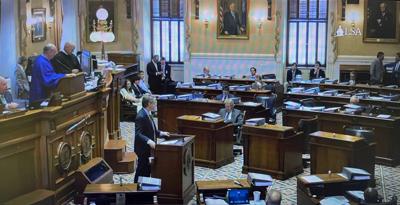For years we’ve heard maddening stories about vulnerable South Carolinians being overlooked, undertreated and even abused by caregivers paid with our tax dollars. The Department of Disabilities and Special Needs was the latest and most egregious: Its completely dysfunctional part-time governing board looked the other way while abuses mounted , staged amateur spy games to run off competent directors, lobbied to get special treatment for its own members and their relatives and abused our open-government law so blatantly as to make a great comedy routine, if it weren’t real. Even absent the abuses, our disjointed collection of autonomous medical fiefdoms forced poor people seeking routine health care and anybody with disabilities and mental health and substance abuse problems to navigate a confusing maze of alphabet soup health services agencies: DDSN, DAODAS, DMH, DHEC, HHS and a few other stragglers scattered throughout the government.
They were shuttled back and forth between the agencies, a process that wasted their time and our money and extended their suffering, as agencies sought to push the problem on to another department. The system — or more accurately the lack of a system — always looked bad on paper, and in 2023 an exhaustive outside study concluded that we had the most disjointed approach to public health in the nation. Remarkably, the Senate set about trying to right that, with an ambitious plan to abolish the autonomous governing boards and consolidate six health agencies into one, controlled by the governor.

After fits and starts, the House approved a nearly identical plan. And many know what happened next: With just minutes left before the 2024 legislative session expired, a band of House misfits trafficking in innuendo and fabricated claims used a procedural delay maneuver to kill the legislation. Gov.
Henry McMaster had been a cheerleader for the megamerger, but he fell back this year and asked only that lawmakers dismantle the part-time boards overseeing Disabilities and Special Needs and the Department of Mental Health and add those agencies to his Cabinet. Fortunately, the Senate’s leaders — Finance Chairman Harvey Peeler and President Tom Alexander along with Labor, Commerce and Industry Chairman Tom Davis — weren’t willing to settle for so little. They did scale back, but in addition to abolishing both of those boards and putting the agencies directly under the governor’s control, they merged them with the Department of Alcohol and Other Drug Abuse Services to form a new Department of Behavioral Health and Developmental Disabilities.
The Senate passed the bill in March, the House quietly passed it earlier this month, and on Wednesday, after a five-minute overview and with no questions, the Senate voted 40-2 to send the bill to Mr. McMaster’s desk. We eagerly await his signature.
That still leaves separate departments of Public Health (already split from Environmental Services in 2023), Health and Human Services and Aging, but it combines the three agencies with the most functional overlap, eliminates two of the state's most problematic autonomous governing boards and in so doing makes those former commission-run agencies accountable for their actions for the first time ever. That’s a huge improvement that looks modest only when compared to last year’s plan. S.
2 also represents the largest reform of South Carolina’s duplicative and labyrinthine governmental structure in a quarter century, which means it's time for advocates of efficiency and accountability to start looking for the next area for reform. And it puts a sharper focus on the sore thumbs in the health field — particularly the tiny Department of Aging — that still need to be swept into a larger agency to make it easier for governors to exercise effective control of the executive branch of government. Click here for more opinion content from The Post and Courier.
.
Technology

Editorial: A new day for health care in South Carolina, at long last (copy)

For years we’ve heard maddening stories about vulnerable South Carolinians being overlooked, undertreated and even abused by caregivers paid with our tax dollars.















